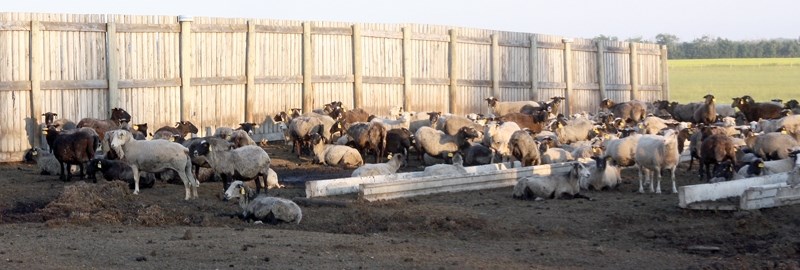Two dozen sheep are dead, and Fish & Wildlife officers have confirmed a cougar is in the area — possibly with young cubs.
Rancher Greg Fortin and his mother Esther Fortin keep sheep on a farm southwest of town in the Hazel Bluff area, and last Saturday morning saw that something had killed the sheep.
“There was eight sheep dead and it isn’t pretty when they kill them,” Greg Fortin said.
At first, they thought it must have been coyotes because they’ve had problems with them in the past.
“We had coyotes come catch them a couple years ago and they dug under the fence,” Esther Fortin said. “We checked all of the fences to see if they’d dug underneath, but there was nothing.”
Sunday morning and Monday morning turned up more dead sheep, so they called Fish & Wildlife officers, who confirmed a cougar was responsible.
Alberta Justice spokesperson Brendan Cox said Fish & Wildlife officers confirmed early last week the sheep were killed by a cougar.
“Officers and a regional problem wildlife specialist went to investigate,” he said. “They have confirmed cougars are responsible; it looks like 25 sheep have been killed.”
While the number of cougars involved hasn’t been confirmed, Cox said the high number of animals that have been killed point to the possibility this is a mother with young cubs.
“Sometimes a cougar will cover its kill or bury it. These sheep had been fed upon but it also seems as though not all of them have been consumed,” he said. “With the number involved, and the way they continue to prey on the sheep, it just seems likely it would be a mother teaching her young.”
Fish & Wildlife officers have placed 12 traps at three bait stations on the property — but had not as of Tuesday afternoon seen any cougars.
While cougar sightings in the area are relatively rare, and attacks on livestock more so, they are known to live in Alberta and in the Westlock area in particular.
Cox said there have not been any cougar sightings in Westlock County so far this year, but there was one earlier this month in the County of Barrhead and two before that in Lac St. Anne County.
“It’s always rare to see a cougar because they’re so shy of humans, but in this particular area cougars are known to exist,” he said.
“It’s not entirely uncommon to hear of them.”
He noted despite a common rumour, the provincial government does not introduce cougars into an area as a way to control deer population.
“It’s just a rumour; it’s not true,” he said. “We don’t relocate cougars to manage deer populations. Both cougars and deer are hunted, so their populations are managed through that.”
Cox said ranchers and residents in the area can take precautions to minimize the risk to themselves and to their livestock. Ranchers should consider keeping their herds and/or flocks close to them, and be vigilant in keeping an eye out for predators.
As far as the risk to humans, it’s very small but nonetheless exists. If a cougar knows a human is around it will most likely leave the area, but in the event a cougar does attack, people should make themselves appear as large as possible and shout aggressively at the animal without turning their back.
“Any instances of a cougar attacking humans or making that kind of contact are very rare, but when it does happen, people have a much higher chance of getting away if they fight back, so never give up,” he said.
It’s also a good idea to carry bear spray if going out in areas where cougars or bears are known to exist, he added.
As for the lost livestock, there is compensation available.
Any rancher that loses animals to wild predators is eligible for full market value of the animals, once Fish & Wildlife officers confirm the animals were lost to predation.
It doesn’t make it any easier to lose animals, though, regardless of the cause.
Anyone who spots a cougar should call the Barrhead Fish & Wildlife office at 780-674-8236, or if it’s after hours they can call the Report-a-Poacher line at 1-800-642-3800.

